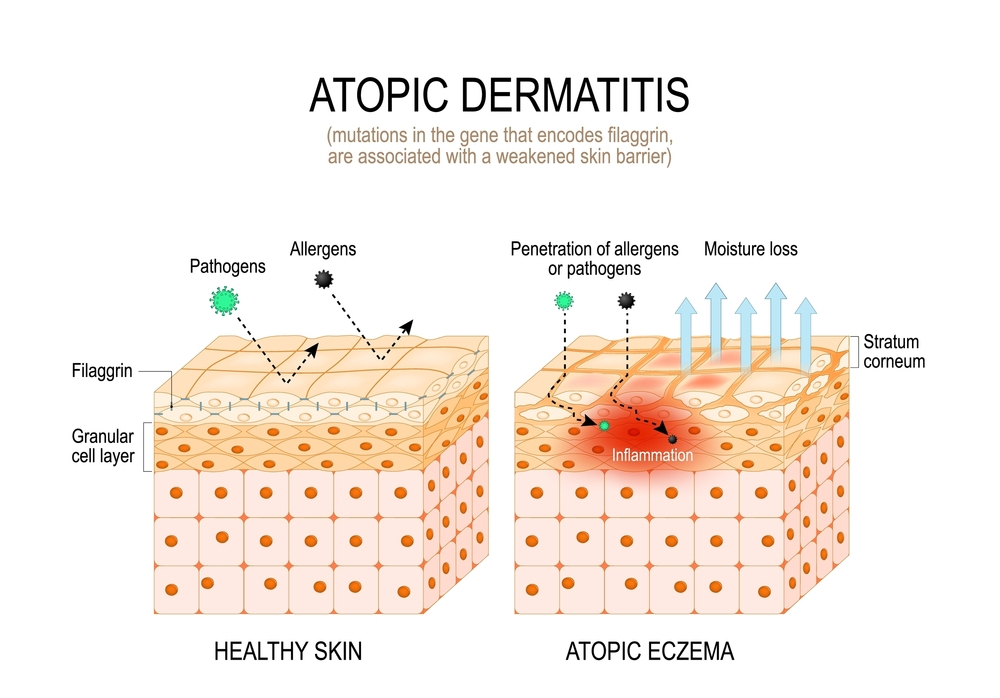Last Updated on February 7, 2024
Weeping eczema, also known as infected eczema, is a complication of regular eczema that takes the condition to a new level of discomfort and urgency. Its symptoms present oozing fluid, blisters, crusting, redness and inflammation, and itching.

What is Weeping Eczema?
Weeping Eczema, also known as wet or exudative, represents a more severe and inflammatory stage of eczema. Additionally, the condition presents fluid-filled blisters, oozing, and crusting of the affected skin. However, the persistent wetness sets Wet Eczema apart from other eczema subtypes and poses unique challenges in terms of management and treatment.
Different Types
Weeping eczema is multifaceted. However, here are the most common forms:
- Atopic eczema: The most common type, it often affects children and can progress to weeping with scratching and infection.
- Dyshidrotic eczema: Blisters on the palms and soles, often triggered by stress or allergies, lead to weeping and crusting.
- Nummular eczema: Coin-shaped lesions, especially on the hands and arms, can develop fluid-filled blisters and weep with scratching.
How Does Eczema Occur? Phenomenon

If the immune system is dysfunctioning or skin barrier is disrupted for any reason, Eczema manifests through a cascade of immune responses, including the release of inflammatory mediators like histamine and cytokines, resulting in itching, redness, and skin lesions.
What Are The Symptoms of Weeping Eczema?
Wet or Weeping Eczema exhibits distinctive symptoms that significantly impact an individual’s skin health and overall well-being:
Oozing Blisters:
The hallmark of Wet Eczema is the presence of fluid-filled blisters rupturing, leading to clear or yellowish fluid oozing.
Crusted Skin:
The oozing fluid eventually dries, forming thick crusts on the skin’s surface. Consequently, these crusts become itchy and contribute to further irritation.
Intense Itching:
Individuals with Wet Eczema often experience severe itching, which can exacerbate the condition by encouraging scratching and further skin damage.
Redness and Inflammation:
The affected areas typically exhibit pronounced redness and inflammation, indicating the heightened immune response in the skin.
Pain and Discomfort:
Wet Eczema can be painful, causing discomfort and a burning sensation, particularly in areas with open sores.
Skin Discoloration:
Chronic Wet Eczema may lead to skin discoloration, with affected areas appearing darker or lighter than the surrounding skin.
Weeping Eczema vs Xerotic Eczema
| Feature | Weeping eczema | Xerotic eczema |
| Symptoms | Red, inflamed skin with oozing, crusting, and intense itching | Dry, flaky skin with mild itching |
| Causes | Infection, allergies, stress, irritants, environment | Dry skin, aging, cold weather, medications, medical conditions |
| Treatment | Topical corticosteroids, antibiotics, antihistamines, moisturizers | Emollients, moisturizers, humidifiers, treating underlying conditions |
What Causes Weeping Eczema?
Understanding the underlying causes of Weeping or Wet Eczema is essential for devising effective treatment strategies. However, several factors contribute to the development and exacerbation of this challenging condition.
Compromised Skin Barrier:
Individuals with a compromised skin barrier due to genetics or pre-existing skin conditions are more susceptible to Wet Eczema. Nevertheless, a weakened barrier allows irritants to penetrate the skin, triggering an inflammatory response.
Allergens and Irritants:
Exposure to allergens, such as certain foods, plants, or substances in skincare products, and irritants, like harsh soaps or chemicals, can trigger or worsen Exudative Eczema.
Infections:
Secondary bacterial or fungal infections can complicate Wet Eczema. Moreover, scratching the affected areas may introduce microbes, leading to infection and further worsening of symptoms.
Stress and Emotional Factors:
Stress and emotional factors can contribute to the flare-up of Wet Eczema. In addition, the intricate connection between the mind and skin health is well-established, and stress management is often a crucial aspect of treatment.
Weather Conditions:
Extreme weather conditions and sweltering and humid environments can aggravate Weeping Eczema. Moreover, sweating and excessive moisture on the skin may contribute to the weeping and oozing characteristics.
How To Dry Up Weeping Eczema?
Effectively managing Wet Eczema involves a multifaceted approach. However, treatment plans should be tailored to the individual’s specific condition and may include the following:
Topical Steroids:
Recommend using topical corticosteroids to reduce inflammation and itching. It is essential, however, to monitor their use closely to avoid side effects such as skin thinning.
Topical Antibiotics or Antifungals:
However, in cases where bacterial or fungal infections are present, healthcare providers may recommend topical antibiotics or antifungal medications to address the underlying infection.
Emollients and Moisturizers:
Regular and liberal use of emollients and moisturizers helps hydrate the skin and repair the compromised barrier. However, non-irritating, fragrance-free options are preferable.
Wet Dressings:
Wet dressings and wet wraps over affected areas can relieve and prevent scratching. Nonetheless, this technique helps cool the skin and enhance the absorption of topical medications.
Oral Medications:
In severe cases, healthcare providers may prescribe oral medications such as corticosteroids or immunosuppressants to control inflammation and manage symptoms. However, these medications are not for use for longer periods.
Avoiding Triggers:
Nevertheless, identifying and avoiding triggers, including specific allergens, irritants, or stressors, is crucial in preventing flare-ups of Weeping Eczema.
Phototherapy:
Light therapy or phototherapy may be recommended to reduce inflammation and promote healing. However, this treatment is administered under controlled conditions and requires professional supervision.
Stress Management:
Moreover, incorporating stress management techniques, such as meditation, mindfulness, or counseling, can be integral to preventing stress-related flare-ups.
Also Read
- Asteatotic Eczema: Symptoms, Causes, and Treatment
- Intrinsic Eczema: Causes, Symptoms, and Treatments
- Follicular Eczema Dos and Don’ts
- Flexural Eczema, Symptoms, Treatment, and Prevention
Living with Wet Eczema: Coping Strategies
However, beyond medical interventions, individuals with Wet Eczema often find solace in adopting coping strategies that enhance their quality of life:
Gentle Skincare Routine:
Establishing a gentle skincare routine involves using mild, fragrance-free products and avoiding harsh chemicals that may exacerbate symptoms.
Cool Compresses:
Cool compresses can provide relief from itching and soothe inflamed skin. In addition, applying a clean, damp cloth to affected areas for short durations may offer comfort.
Cotton Clothing:
Wearing loose-fitting, breathable cotton clothing minimizes friction and allows the skin to breathe, reducing the risk of irritation.
Hydration and Nutrition:
Staying well-hydrated and maintaining a balanced diet rich in vitamins and minerals contribute to overall skin health.
Regular Check-ups:
In addition, regular check-ups with a dermatologist ensure ongoing monitoring of the condition and adjustment of treatment plans as needed.
Foods To Avoid In Wet Eczema
While individual triggers can vary, certain foods are more likely to exacerbate wet eczema symptoms. For this reason, we are enlisting some of the top contenders to avoid or limit in your diet:
Dairy:
Cow’s milk protein is a common culprit, triggering inflammation and worsening eczema flares in some individuals. However, consider alternatives like plant-based milk made from soy, almond, oat, or coconut.
Eggs:
Egg allergies are frequent, leading to flare-ups of eczema. However, remember hidden egg ingredients in baked goods, processed foods, and even some vaccines if you suspect egg sensitivity.
Wheat and Gluten:
Gluten sensitivity or full-blown celiac disease can worsen eczema symptoms. However, add gluten-free grains like rice, quinoa, buckwheat, or millet if you suspect wheat is a trigger.
Soy:
While soy milk can be a dairy alternative, soy can trigger sensitivities or allergies in some people, leading to eczema flares. Moreover, pay attention to hidden soy ingredients like lecithin, edamame, and tofu.
Nuts and Seeds:
Nuts like peanuts, almonds, walnuts, and cashews can trigger allergic reactions and worsen eczema. However, be cautious with nut butter and baked goods containing wild. Nevertheless, seeds like sunflower and sesame can also be culprits for some individuals.
Citrus Fruits:
Oranges, grapefruits, lemons, and limes contain citric acid, which can irritate sensitive skin and exacerbate eczema. However, consider using less acidic fruits like berries, melons, or bananas.
Tomatoes:
Though technically a fruit, tomatoes are a common eczema trigger due to their nightshade family affiliation. Therefore, consider alternative vegetables like carrots, cucumbers, or leafy greens.
Spicy Foods:
Chili peppers and other spicy foods can irritate the skin and worsen eczema symptoms. Hence, consider milder spices or herbs for flavoring your meals.
Processed Foods:
Heavily processed foods contain inflammatory ingredients, artificial additives, and hidden allergens, which can contribute to eczema flares. Therefore, opt for whole, unprocessed foods whenever possible.
Alcohol:
Alcohol can dehydrate the skin and worsen eczema symptoms. Therefore, avoid alcohol altogether.
Conclusion
With its characteristic oozing and crusting, weeping Eczema poses unique challenges for those affected. Therefore, navigating the causes of symptoms and treatment options requires a comprehensive and individualized approach. Additionally, individuals can strive towards effective management and improved quality of life by understanding the intricacies of Wet Eczema and adopting a combination of medical interventions, lifestyle adjustments, and coping strategies. Nevertheless, seeking professional medical advice and maintaining open communication with healthcare providers are fundamental steps towards healthier and happier skin.
